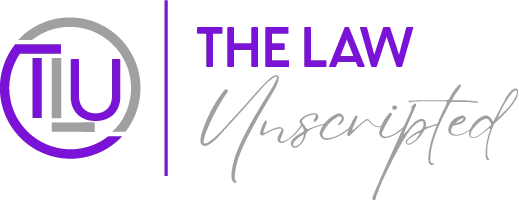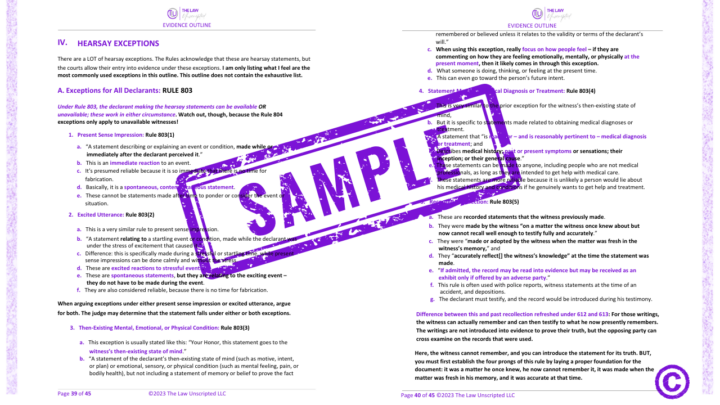Evidence Lectures
$50.00
Join attorney Virginia Tehrani for a conversational, interesting attack on EVIDENCE through some real-world examples to help you understand and remember the main premises of EVIDENCE.
In Evidence Video Lecture #1, learn everything you need to know about the INTRODUCTION OF EVIDENCE in trials.
In Video Lecture #2, learn all about CHARACTER EVIDENCE, IMPEACHMENT, and HEARSAY.
Evidence Lecture #1 and #2
Join attorney Virginia Tehrani for a conversational, interesting attack on EVIDENCE through some general tips and tricks for tackling EVIDENCE examination questions with real-world examples to help you understand and remember the main premises.
In the first video, learn about the general principles of the Federal Rules of Evidence (FRE), including the Introduction of Evidence at Trial, Relevancy, and Witness Opinions in this first of two Video Lectures on EVIDENCE. Attorney Virginia Tehrani uses her 18 years of experience as a trial attorney as a prosecutor, criminal defense attorney, and civil attorney, to describe, explain and review the Federal Rules of Evidence. She gives examples of how the rules have been used and applied in some of her own cases, along with some example lines of questioning for entry of evidence and the laying of foundation.
Virginia begins the lecture with how to introduce evidence into trial. She handles the basic examination of witnesses according to FRE 611, including the basics of direct and cross examination. She also describes when and how the judge can examine a witness (Rule 614), what to do with hostile witnesses (Rule 607), the Rule on Witnesses (Rule 615), and Judicial Notice (Rule 201). She details the methods and application of authentication and identification of evidence under FRE Article IX, Rules 901 and 902. And finally, Virginia explains the Best Evidence Rules under FRE Article X, along with the Rule of Completeness codified in Rule 106.
In the second part of the lecture, Virginia pulls out the basic rules of relevancy and describes how these rules work for real cases and trials. She discusses the basic test of relevancy as a threshold trial question under FRE 401 and 402, along with Rule 104’s provisions for making offers of proof for matters of conditional relevance. She then describes the infamous “balancing test” under FRE 403, whereby evidence can be excluded if the prejudicial effect substantially outweighs the probative value of the information. Through some of her own cases, she discusses specifically excluded evidence under FRE Article IX, including subsequent remedial measures, compromise offers and negotiations, offers to pay medical expenses, plea discussions and liability insurance.
Finally, our attorney highlights the most important pars of a witness’s testimony – their opinions. Virginia details a witness’s requirements for competency (Rule 601), for having personal knowledge (Rule 602), for having their recollection of facts refreshed (Rule 612) and lay and expert opinions (Rule 701, Rule 702, and Rule 703). Through Virginia’s interesting thoughts and experiences, we learn how to qualify an expert witness to testify as to their opinions and what types of expert witnesses can provide.
In the second video, learn about the general principles of the Federal Rules of Evidence (FRE), including Character Evidence, Impeachment, and Hearsay in this second of two Video Lectures on EVIDENCE. For this video, Virginia describes the difference between character and habit evidence and testimony, including what types of questions can be asked and which answers can be given. She highlights FRE 404(a) (the “Mercy Rule”), FRE 404(b) (Other Crimes, Wrongs, or Acts) and FRE 405 (Habit Evidence). We explain the ways character traits and prior actions can be used in court and when and why they must sometimes be excluded. She also discusses the rules as to if and when any sexually-related conduct may be brought into a trial against a defendant, a victim, and/or another witness. Walk with Virginia through all the ways crimes, wrongs, acts, habit, and character traits for peacefulness or violence and for truth or untruthfulness (FRE 608) can be used for impeachment purposes in a court.
Virginia also explains how attorneys impeach witnesses on the basis of credibility, including through use of prior criminal convictions (FRE Rule 609) and use of a witness’s prior statement (FRE 613).
Finally, Virginia does a full recap of Hearsay under Article VIII of the FRE. She defines and describes the definitions of hearsay, how hearsay is related to the 6th Amendment’s Confrontation Clause and testimonial evidence, hearsay exclusions under Rule 801 (non-hearsay testimony), hearsay exceptions for all declarants under Rule 803, and hearsay exceptions for unavailable declarants under FRE 804. Find out about dying declarations, methods of proving that a witness is unavailable, co-conspirators’ statements, statements made by a party opponent, statements against interest, present sense impressions, and more!
Join Virginia for interesting lectures, and walk away with a firmer grasp on the basics of EVIDENCE so that you can ace your law school exams and the Bar Examination.



